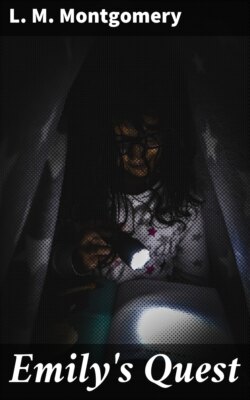Читать книгу Emily's Quest - L. M. Montgomery - Страница 33
На сайте Литреса книга снята с продажи.
V
ОглавлениеTable of Contents
Emily finished her book in six weeks—finished it at dawn one morning. She flung down her pen and went to her window, lifting her pale, weary, triumphant little face to the skies of morning.
Music was dripping through the leafy silence in Lofty John’s bush. Beyond were dawn-rosy meadows and the garden of New Moon lying in an enchanted calm. The wind’s dance over the hills seemed some dear response to the music and rhythm in her being. Hills, sea, shadows, all called to her with a thousand elfin voices of understanding and acclaim. The old gulf was singing. Exquisite tears were in her eyes. She had written it—oh, how happy she was! This moment atoned for everything.
Finished—complete! There it lay—A Seller of Dreams—her first book. Not a great book—oh, no, but hers—her very own. Something to which she had given birth, which would never have existed had she not brought it into being. And it was good. She knew it was—felt it was. A fiery, delicate tale, instinct with romance, pathos, humour. The rapture of creation still illuminated it. She turned the pages over, reading a bit here and there—wondering if she could really have written that. She was right under the rainbow’s end. Could she not touch the magic, prismatic thing? Already her fingers were clasping the pot of gold.
Aunt Elizabeth walked in with her usual calm disregard of any useless formality such as knocking.
“Emily,” she said severely, “have you been sitting up all night again?”
Emily came back to earth with that abominable mental jolt which can only be truly described as a thud—a “sickening thud” at that. Very sickening. She stood like a convicted schoolgirl. And A Seller of Dreams became instantly a mere heap of scribbled paper.
“I—I didn’t realise how time was passing, Aunt Elizabeth,” she stammered.
“You are old enough to have better sense,” said Aunt Elizabeth. “I don’t mind your writing—now. You seem to be able to earn a living by it in a very lady-like way. But you will wreck your health if you keep this sort of thing up. Have you forgotten that your mother died of consumption? At any rate, don’t forget that you must pick those beans to-day. It’s high time they were picked.”
Emily gathered up her manuscript with all her careless rapture gone. Creation was over; remained now the sordid business of getting her book published. Emily typewrote it on the little third-hand machine Perry had picked up for her at an auction sale—a machine that wrote only half of any capital letter and wouldn’t print the “m’s” at all. She put the capitals and the “m’s” in afterwards with a pen and sent the MS. away to a publishing firm. The publishing firm sent it back with a type-written screed stating that “their readers had found some merit in the story but not enough to warrant an acceptance.”
This “damning with faint praise” flattened Emily out as not even a printed slip could have done. Talk about three o’clock that night! No, it is an act of mercy not to talk about it—or about many successive three o’clocks.
“Ambition!” wrote Emily bitterly in her diary. “I could laugh! Where is my ambition now? What is it like to be ambitious? To feel that life is before you, a fair, unwritten white page where you may inscribe your name in letters of success? To feel that you have the wish and power to win your crown? To feel that the coming years are crowding to meet you and lay their largess at your feet? I once knew what it was to feel so.”
All of which goes to show how very young Emily still was. But agony is none the less real because in later years when we have learned that everything passes, we wonder what we agonised about. She had a bad three weeks of it. Then she recovered enough to send her story out again. This time the publisher wrote to her that he might consider the book if she would make certain changes in it. It was too “quiet.” She must “pep it up.” And the ending must be changed entirely. It would never do.
Emily tore his letter savagely into bits. Mutilate and degrade her story? Never! The very suggestion was an insult.
When a third publisher sent it back with a printed slip Emily’s belief in it died. She tucked it away and took up her pen grimly.
“Well, I can write short stories at least. I must continue to do that.”
Nevertheless, the book haunted her. After a few weeks she took it out and reread it—coolly, critically, free alike from the delusive glamour of her first rapture and from the equally delusive depression of rejection slips. And still it seemed to her good. Not quite the wonder-tale she had fancied it, perhaps; but still a good piece of work. What then? No writer, so she had been told, was ever capable of judging his own work correctly. If only Mr. Carpenter were alive! He would tell her the truth. Emily made a sudden terrible resolution. She would show it to Dean. She would ask for his calm, unprejudiced opinion and abide by it. It would be hard. It was always hard to show her stories to any one, most of all to Dean, who knew so much and had read everything in the world. But she must know. And she knew Dean would tell her the truth, good or bad. He thought nothing of her stories. But this was different. Would he not see something worth while in this? If not—
